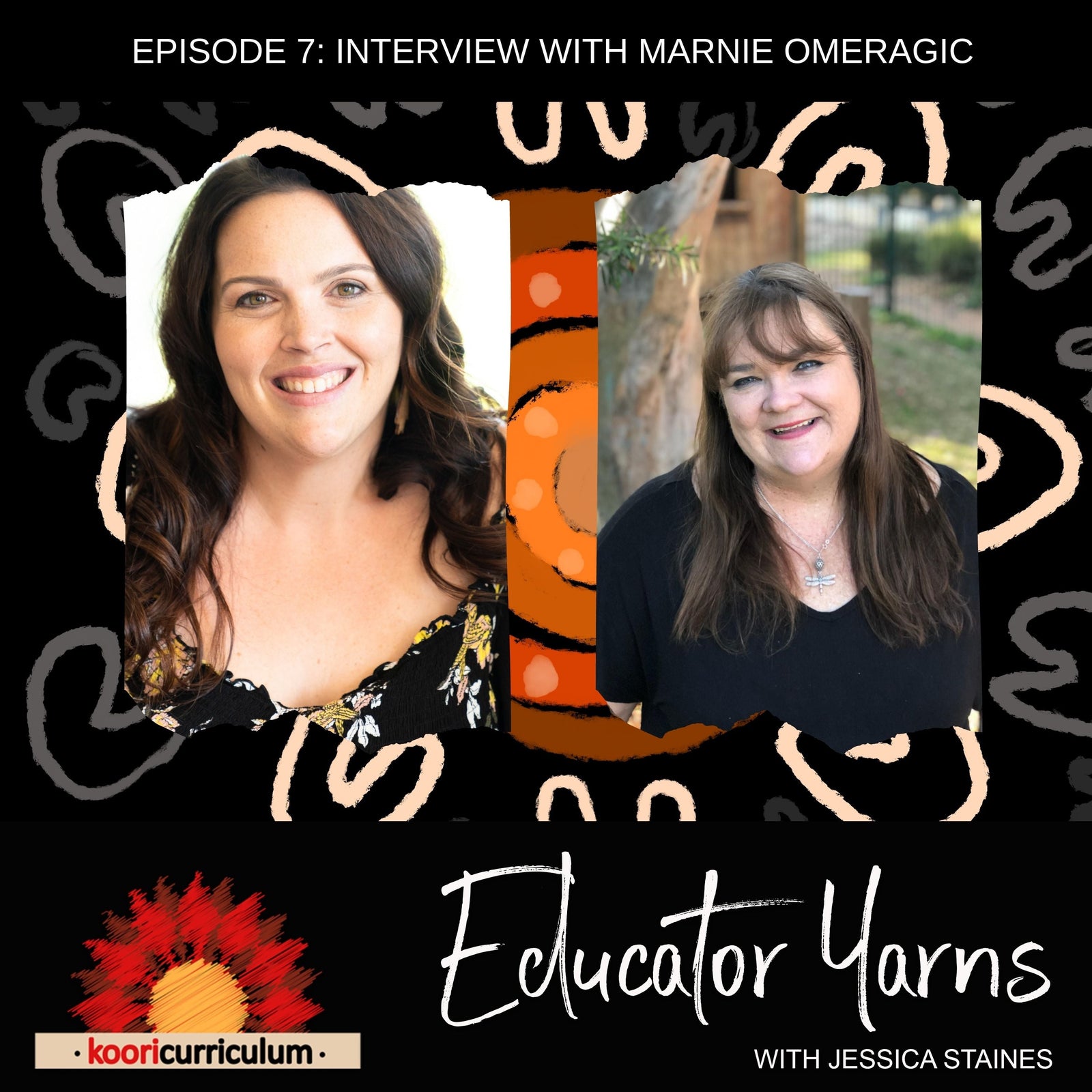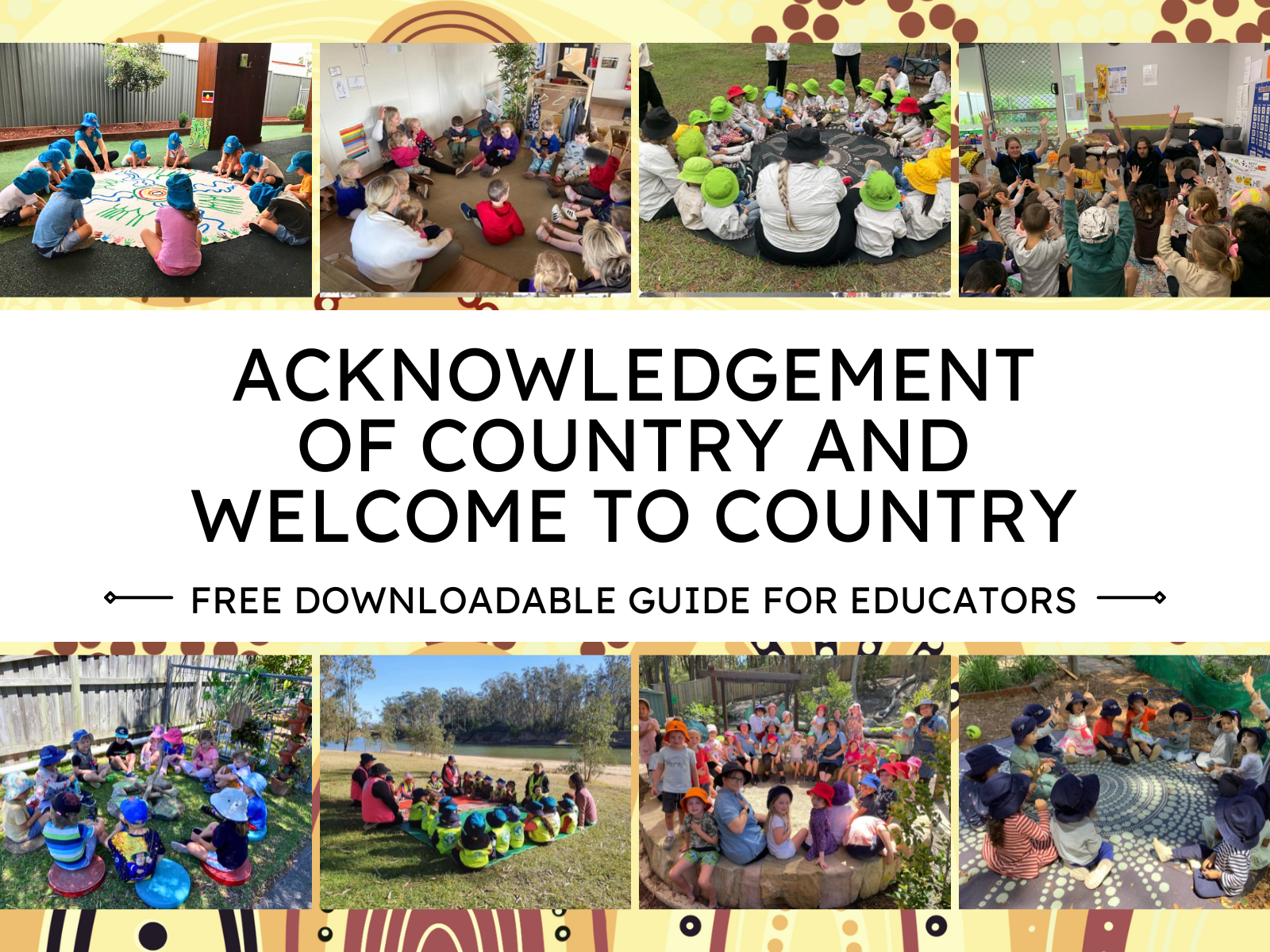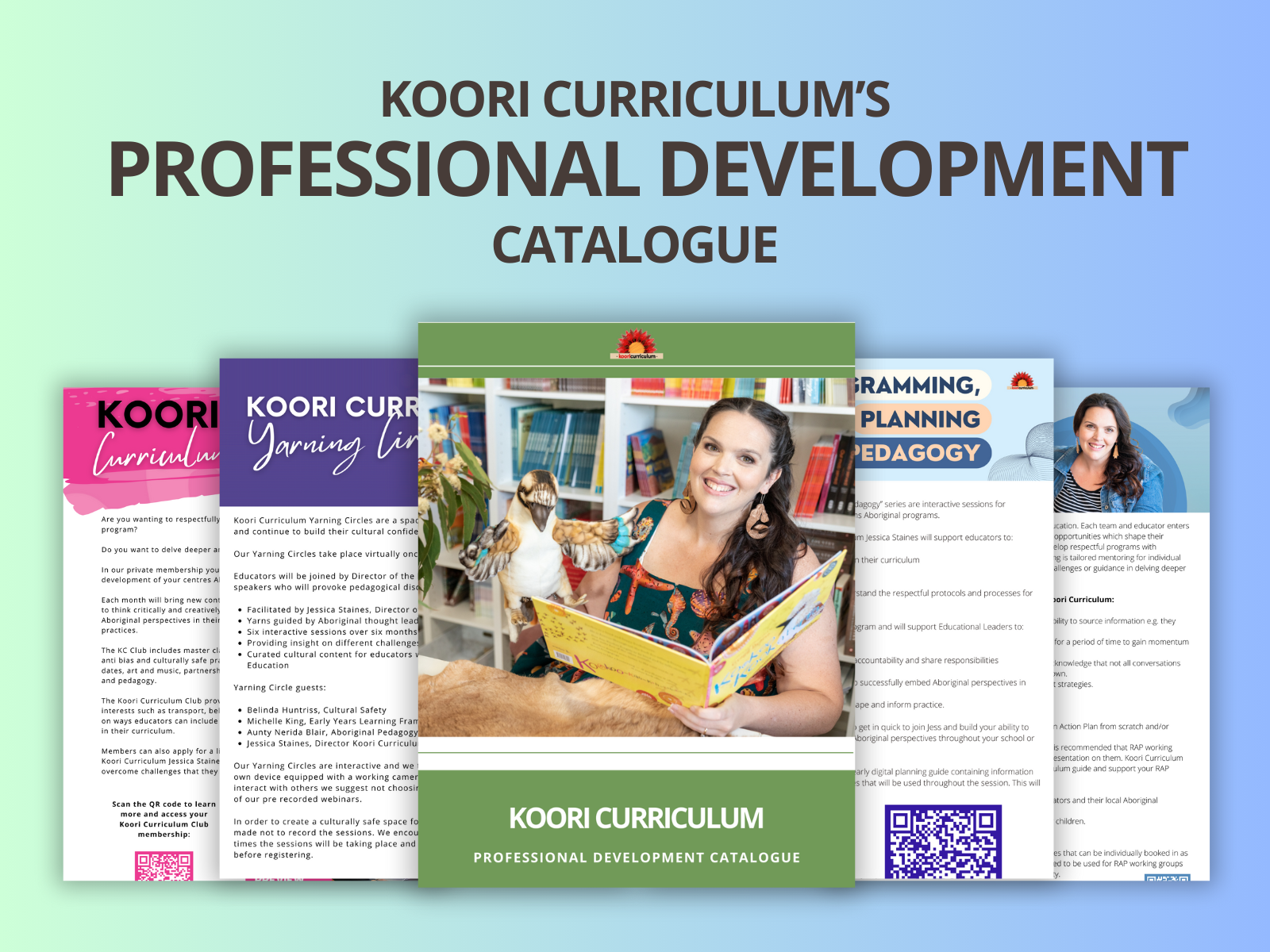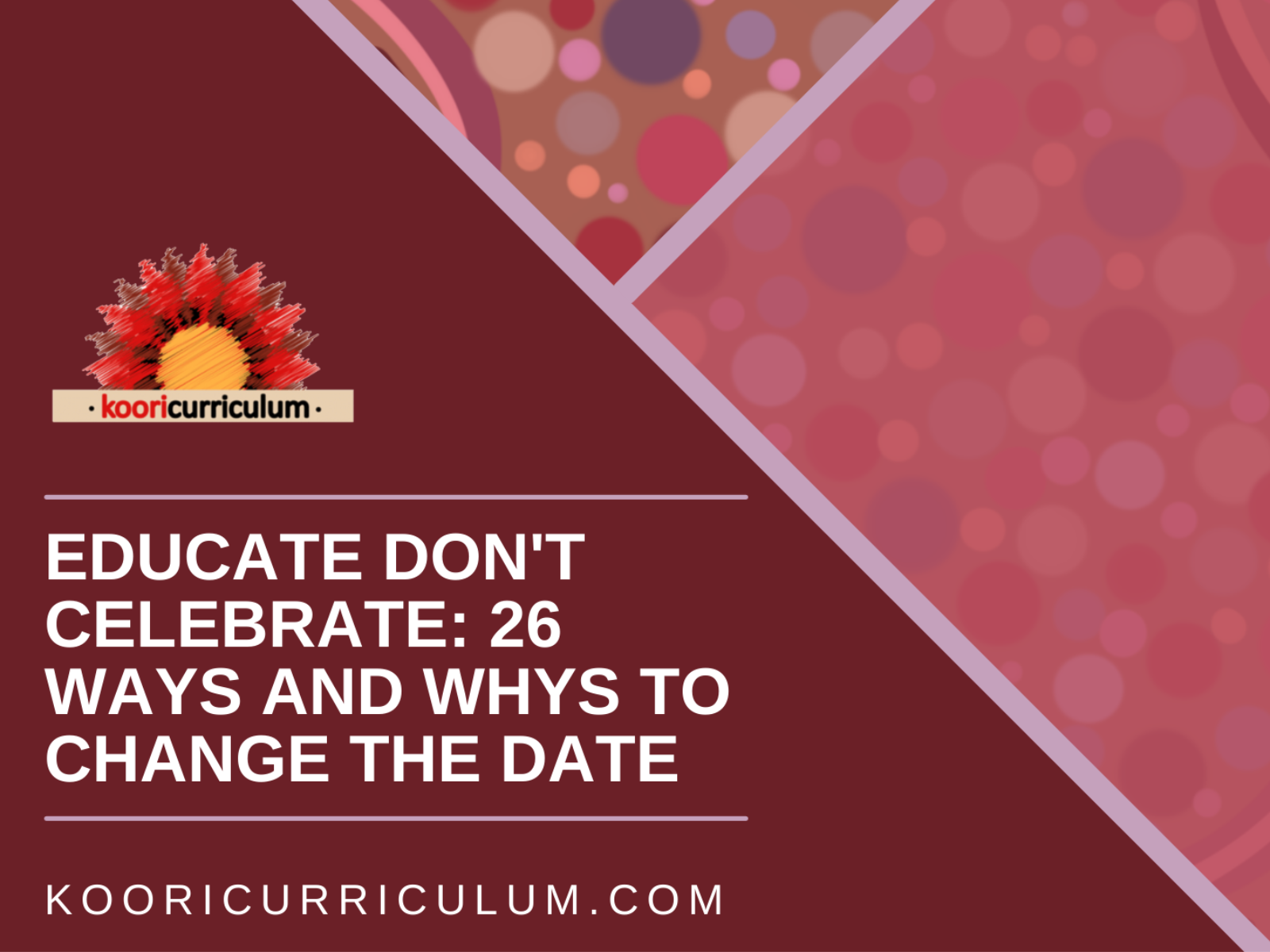
Educator Yarns Season 2 Episode 7: Interview with Marnie Omeragic
Today on Educator Yarns Jessica speaks with Marnie Omeragic, Director on Wangal Land in Sydney’s Concord West.
Over the past several years Marnie and her team have worked towards embedding Aboriginal perspectives and creating a greater connection to Country. Marnie has seen their efforts transform their service from a place wanting to acknowledge and respect local Aboriginal culture to becoming a place of cultural safety for local Aboriginal families and community.
In this interview Marnie talks about slowing her practice down, cultivating lasting and meaningful relationships amongst the community and what it means to her and her team to work in partnership. A partnership with not only her, the families and her community, but a partnership with the land on which they stand.
Show Notes
Marnie Omeragic:
When the time comes those families just feel so welcomed. Everything speaks at that foundation of what we're doing. They know that about this space before they even attend.
Jessica Staines:
In every play space you can see resources that are inclusive of culture.
Marnie Omeragic:
How that connection is the strength within our community.
Speaker 3:
You're listening to the Kohinoor Curriculum Educator Yarns with Jessica Stained.
Jessica Staines:
I'd like to acknowledge the [inaudible 00:00:40] people, the traditional owners of the land on which I am recording this podcast. I pay my respects to their elders both past, present and emerging. And pay my respects to all Aboriginal and Torres Strait Islander listeners.
Hi everyone. My name is Jessica Stained, director of the Kohinoor Curriculum. For those of you that aren't familiar with our podcast, season two is all about our new book, Educator Yarns. We're meeting and interviewing with our educator contributors from right around Australia who will be sharing little snippets of their piece.
It will be a combination of stories about why embedding Aboriginal perspectives is so important, how to connect with local community, how to embed Aboriginal perspectives in our programme, how to work with anti-biassed approaches and so much more. So make sure you listen in and enjoy the episode. Bye for now.
Today's guest is Marnie, director of the amazing Concord West Rhodes Preschool. Some of you may remember her from season one and we're getting her back because we were lucky enough to have her as a contributor for our new book, Educator Yards. And this time she'll be joining us to speak about the importance of working with Aboriginal and Torres Strait Islander families.
Originally the preschool didn't have any Aboriginal families accessing it and didn't for many, many decades. But through their work of engaging with community and creating a culturally inclusive and safe space families started to arrive. So let's get her on the line and get her to share a little bit of a sneak peek of her contribution in our latest book.
Hi Marnie. How are you going?
Marnie Omeragic:
Hi Jess. Good thanks.
Jessica Staines:
Awesome. Well thanks so much for coming back on to the Educator Yarns podcast for our season two. And this season is all about talking about our new book which is coming out later in the year, which is also called Educator Yarns. And we were lucky enough for you to be one of our book's contributors. So I thought I'd just get you to start by quickly introducing yourself to listeners that haven't heard you before in our season one.
Marnie Omeragic:
Mm-hmm (affirmative). So it's been exciting to be part of this new upcoming book. So again, Marnie, I'm the director at Concord West Rhodes Preschool. We've been yarning and part of the core curriculum, yarning circles and embedding indigenous practises within our service for a number of years now, probably six or seven, I guess. Yeah.
We didn't have any Aboriginal families or Torres Strait Islander families. We didn't have any staff within our community for a very long time. And it's only been in the last four to five years that we have had a few families come join us and their siblings come through the preschool which has been really, really exciting. Prior to that it's just been a mixture of Anglo-Saxon and Italian-Greek, and recently sort of Korean, Chinese, Indian families. So it's a very diverse multicultural space. But previously we didn't have any of our indigenous family community members here outside of our visitors and inclusion within the curriculum.
So we always had Matthew Doyle come and sharing culture with us. And over the years we've had artists and performers and knowledge keepers and all forms of visitors coming in and sharing culture with us and the children to inform and up skill staff and all of that. But now I guess it takes a more meaningful space now that we do actually have families amongst our community that identify as Aboriginal and Torres Strait.
Jessica Staines:
Yeah. You've been at Concord Rhodes Preschool for 30 years. Yeah?
Marnie Omeragic:
Yes. This is my 30th year. So around about, my gosh, 23 years or so as the early childhood teacher and then more recently in the last seven or so just as the director and educational leader and every other hat that you wear in a community-based preschool.
We have two rooms. Two classes of 20 children, so 40 children in a day. We close for school holidays. It's a very typical preschool setting. They're very big on nature play and connecting to place or country and sustainability, all of those sorts of things. In your previous book that was all mentioned. I guess coming into to this story is more about how that space over the last seven years has come to effect of now us welcoming the families that do identify as Aboriginal Torres Strait Islanders and how partnership and how that connection has built strength within our community in a number of ways.
Jessica Staines:
Mm-hmm (affirmative). And I think what we're seeing now, this change of the demographic of the families that are attending your service, is a really good example is that I know that we have spent time already talking about why this work is so important both for Aboriginal children and non-indigenous children. And when you originally began doing this work and really reviewing your Aboriginal programmes seven odd years ago, at that stage there were no Aboriginal families attending the service but you still thought it was really important that non-indigenous children have that exposure. But in hindsight I guess what you were also doing is being responsive rather than reactive. So you don't wait for the Aboriginal family to knock on your door to think, oh, hang on a second, we better put our power acknowledgement of country or fly the Aboriginal flags or think about how we include culture and do some paydays.
If you did do that, that would be reactive, but what you have done is responsive practise. So your service has been inclusive from the onset for those families. And because you've been out in community sort of developing your cultural capacity and your team's cultural capacity, you're well-known in the local community for inclusive practises and programmes not just for Aboriginal children, but for children from various nationalities and backgrounds. So I think because you're a community based preschool but you're networking all the time, you're out and about all the time, I think that's also gone a long way for building a reputation as a culturally safe service.
Marnie Omeragic:
Yeah. For sure. And it's even before the families arrived here. Our Facebook page, our website, the events that we hold invite the community to the events that we take place in our orientation evenings, everything speaks that foundation of what we're doing. So they know that about this space before they even attend. And then you've got all the visuals within the centre. So then when you sort of step foot in the space you can sort of see it all around as well. It's quite visual. And then I guess because it is so embedded, the language and the play and everything that happens, the children then become that voice. Yeah.
Jessica Staines:
And I think that some of the visual symbols that they would say at the preschool would be that your educators choose to wear Aboriginal printed shirts so you have that. You have beautiful acknowledgements of country around the service. You have Aboriginal artworks by Aboriginal artists but also created and inspired by children. You have the flags like the desk flags over there. And in every play space you can see resources or books, toys that are inclusive of culture. So that is abundantly everywhere.
You also have a bush tucker garden that lots of native plants at the service. So you have during reconciliation week, you have the banner at the front of the service that sort of has the statement about reconciliation. So I think there are lots of simple signals that I know as an Aboriginal person, when I go into services, I look for those signs of respect and those inclusive signs. And because you're sort of at the end of a cul-de-sac, the preschool there, I think thinking through how families come to know about you in the first place. So are they finding out about you via a website or your Facebook page as you've said. And even in those spaces, making it really obvious through the pictures that you choose to post or having an acknowledgement of country at the bottom of the emails, whatever it may be, that there are signs there from the onset as well.
Marnie Omeragic:
Absolutely. And I think it's critical and I think the more diverse that is the better that is in the long run. And to be honest I was three solid years of really intense and purposeful and full on doing this before we ever even saw a family that came to us who identified as Aboriginal to us straight on. So even those things, they weren't there just for that sake. But I'm so grateful that they were there because then when the time comes those families just feel so welcomed. And half the, what's the word I'm looking for? I want to say battle, but it's not a battle. But half the work's done already because they can see it, feel, sense it. [crosstalk 00:11:05]
Jessica Staines:
And you're not putting the spotlight and the responsibility on them to do this bit for you. You've taken the ownership and the responsibility to do that yourself. So yes, you're going to consult with those families and you ask them for feedback but it's not their responsibility to do cultural activities at your service or to advise you on professional development. And I think that's really important is that we don't expect Aboriginal families should do that work for us because not all Aboriginal people know about their culture and history. And I think that it's not a fair expectation for them.
Marnie Omeragic:
Well to be honest I think it's only one family that's been really, really strong in their own family culture. The rest haven't. And so it's been through and with us that that has strengthened and I think that's what it needs. It has to be a partnership. And we at our preschool, that sense of belonging, we settle children in for well over a term before we feel like we're taking off in a lot of spaces and places, that sense of belonging and that feeling of ownership. This is my space. It's a safe place. All that trust is really, really important for all children and families. Particularly, I think it is important for indigenous families just because of the generational trauma that they've experienced over time. A lot of families are a little bit wary of systems.
I call them systems. Educational facilities and health facilities. Just because of the historical stuff that's happened where they've been impacted and families have been broken apart and destroyed. So those systems can be very scary. And then when you develop these partnerships, part of that is just getting to know one another. And I can't imagine a family coming in and within the first couple of weeks are getting them to tell you and teach you about their culture and in a way that you're sort of taking them and showcasing it in a spotlight thing. It's not about that. It's about having conversations, getting to know each other and then us working out what parts of their culture and where they are as a family can be included but also bringing in what we know and what we share in our links.
And we just find over time that as those connections get stronger it's this seesaw process of sharing that happens. And I guess in the story that I'm sharing for this upcoming book, hindsight's a beautiful thing to be able to reflect on on a period of time and sort of see what comes through the other end as they transition off to school. We go, wow.
Things that we were never privy to in the moment of it happening when you can look back in hindsight, you go, these things are so important. And I think that partnership, that safe space, that space where I think the other thing is one thing that's really important for us is that we connect to place. This is what we call it now through our sustainable practises, we have custodianship. So we're taking children outside of the gate and walking on our river skate. We're very lucky. We've got beautiful environment around us.
But the sense of belonging, we've over time begun to understand that through embedding indigenous pedagogy in our curriculum, that connection to place is really strong. And a lot of our children, whether they're indigenous or not having, having that belonging to not just the preschool as a building and a classroom but actually where it's situated. We always say it's Aboriginal land. It always has been, always will be. But that strong connection to that space and place is really, really important. And the opportunities for these children just to thrive in a space that not only acknowledges their culture, welcomes it, teaches it, provides all these experiences for it. Yeah. It's just these, these children, all children just thrive in. I think as educators, we thrive in it too. It's empowering for everybody. I go off on a bit of an excited run by [crosstalk 00:15:27].
Jessica Staines:
We can all hear your passion and I think that's it, is that it's really become not just your professional pedagogy and practise but a mantra for how you are in your life. Yeah.
Marnie Omeragic:
Absolutely. Yeah.
Jessica Staines:
And I think in the peice that is in Educator Yarns it's written by you but it's got the voices of one of the Aboriginal families that's attending a service. And so there's your perspective and their perspective as a family coming in and that how they felt included and what the things where, the key elements were of that process that made them really feel included from their perspective.
So I think as always as you mentioned before, you wrote for the Aboriginal Early Childhood Practise Guide that Red and I edited in 2018 or something. But it's interesting to see how even from then to now how things have moved on with families now that attend the service. So it's this idea that we're on a journey and it's always changing and shifting. Our why is for ever changing because of that as well. Thanks so much Marnie for coming on and having a yarn again.
Marnie Omeragic:
Thank you for the opportunity.
Jessica Staines:
Bye.
Marnie Omeragic:
Bye.
Jessica Staines:
I hope that you enjoyed this episode and had a great little sneak peak between the pages of our new book, Educator Yarns. If you'd like to ask questions or connect with me, best to join our Facebook group, the Kohinoor Curriculum Educated Community which is free for all of our listeners and members. In our next episode of Educator Yarns I'll be meeting with Miku Corscodin and together we'll be discussing the protocols around teaching traditional aspects of Aboriginal culture, such as the dreaming and the use of totems.



